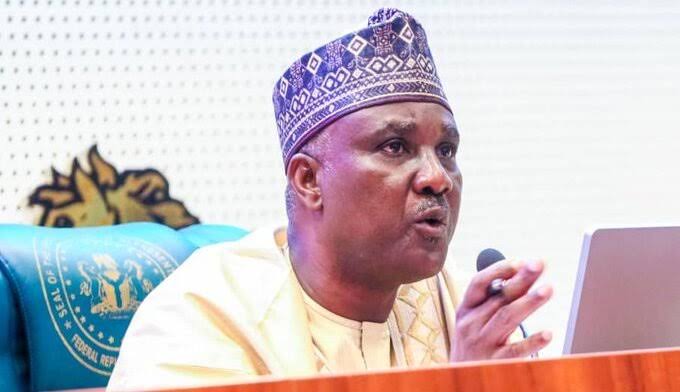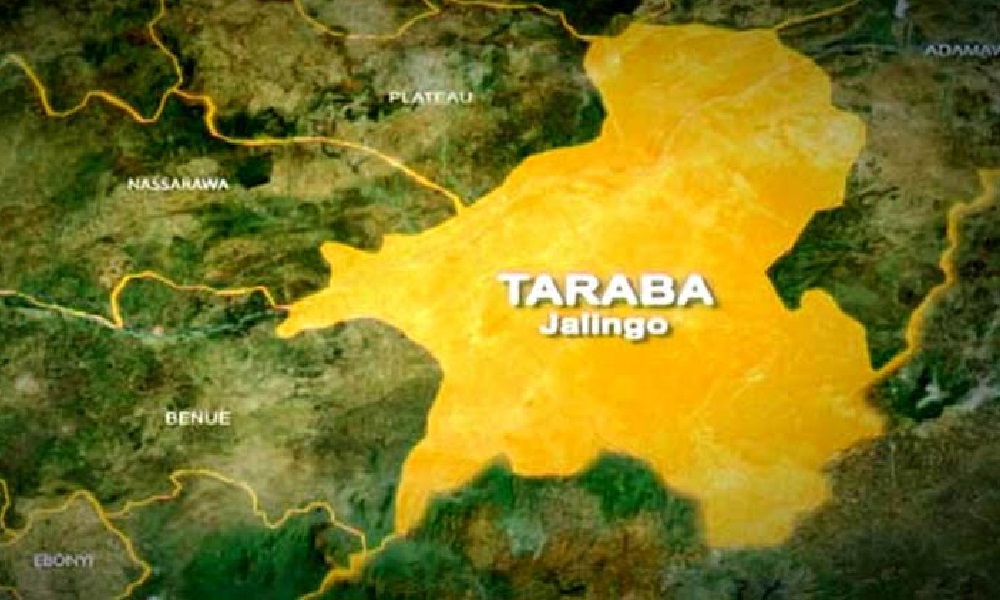News
Speaker Abbas unveils policy on lawmakers, staff capacity development

…as UNDP, other partners hail 10th House’ policy direction
The Speaker of the House of Representatives Hon. Abbas Tajudeen, Ph.D, on Monday, unveiled a policy document on training, retraining and capacity building of members of the 10th House, legislative aides and support staff for better performance and output.
The document, titled ‘Parliamentary Development Programme for 10th House of Representatives, National Assembly, 2023-2027’, was prepared by the Office of the Speaker in collaboration with the United Nations Development Programme.
The Programmes Coordinating Unit (PCU) in the Research and Policy division of the Office of the Speaker spearheaded the process of formulating the document.
At the unveiling done by the Deputy Speaker of the House, Rt. Hon. Benjamin Okezie Kalu, on behalf of the Speaker, were several local and international development and technical partners of the National Assembly.
Speaker Abbas, in his address, noted that the document contained the results of the assessment study conducted by the House with the support of the UNDP and other partners.
“The results are presented today in a document titled Parliamentary Development Programme. This is in line with our Legislative Agenda, which identifies the strengthening of the internal capacity of the legislature as a critical factor towards achieving all our other legislative objectives.
“As a result, the document before us today reflects our current capabilities and the urgent requirements needed to elevate the standards of our legislative functions,” he said.
The Speaker noted that the need for continuous capacity strengthening in the legislature was well known to all. He also stated that the high turnover rates at the National Assembly posed a significant challenge to maintaining continuity and building on the institutional knowledge crucial for effective governance.
He said: “In this 10th Assembly, over 80 per cent of the members are new to the legislature. This phenomenon, combined with the growing expectations of our citizens for transparency, accountability, and efficiency, underscores the urgent need for a robust framework for capacity building within the legislature.
“As evidenced by the level of engagement, especially on social media, our constituents are becoming increasingly aware and involved in the governance process, demanding greater accountability and better service delivery from their representatives.
“This heightened expectation requires us to be at the forefront of legislative knowledge and practices. Also, the intricate landscape of modern governance demands a higher level of expertise, analytical skills, and adaptability among our members and supporting staff.”
Speaker Abbas added that the UNDP’s Capacity and Institutional Needs Assessment Study had “laid bare the gaps in our current system,” stressing that it had highlighted areas where the House needed to strengthen its capabilities to meet the demands of contemporary governance.
The Speaker noted: “These include but are not limited to strengthening our law-making functions, enhancing our legislative drafting capabilities, improving our research and analysis functions, bolstering our oversight mechanisms, and advancing our engagement with the citizens we serve.
“In view of these challenges, we must embrace a culture of continuous learning and capacity development. We must invest in human capital development, ensuring that members, staff and legislative aides are equipped with the knowledge and tools necessary to navigate the complexities of modern legislative work.
“This involves not only formal training programmes but also fostering an environment that encourages innovation, critical thinking, and a deep understanding of the issues facing Nigeria.”
Chairman, House Committee on Monitoring and Evaluation of the Implementation of the Legislative Agenda, Hon. Patrick Umoh, recalled how Speaker Abbas, upon assumption of office, pledged to ensure full and unhindered access to capacity-building programmes in the 10th House.
Hon Umoh, who spoke through the Chairman, House Committee on Media and Public Affairs, Hon. Akin Rotimi, noted that the Speaker met with partners and shared his vision in this regard with them.
He said: “Following the interaction with partners, the United Nations Development Programme (UNDP), took the lead in commissioning a research and study to put together a capacity building development programme for the 10th House.
“After three months of engagement with some committees of the House, development partners, members and management of the bureaucracy, we now have a document to provide direction for capacity building in the House. This is what the Honourable Speaker and the leadership of the House is here to present to us this afternoon.”
In his remarks, Chairman, House Committee on Civil Societies and Development Partners, Hon. Victor Obuzor, thanked the Speaker for the initiative, saying “this is really assisting (us in) our work.”
The Clerk of the House, Dr. Yahaya Danzaria, also described the development as “an inter-parliamentary wedding between the House of Reps and the development partners through the PCU.”
The Clerk also noted that it was “an effort kick-started since the inauguration of the 10th NASS by the Rt. Hon. Speaker with the collaboration of the leadership.”
Partners represented at the event included UNDP, Policy and Legal Advocacy Centre (PLAC), Konrad Adenauer Stiftung (KAS), YIAGA Africa, Civil Society Legislative Advocacy Centre (CISLAC), Order Paper, BudgIT, Partnership to Engage, Reform and Learn (PERL), the European Union and the National Assembly Business Environment Roundtable (NASSBER), among others.
Signed:
Musa Abdullahi Krishi, Special Adviser on Media and Publicity to the Speaker, House of Representatives, Federal Republic of Nigeria.
News
15 huts razed, one injured in renewed Jukun-Tiv violence

A fresh outbreak of ethnic violence between the Jukun and Tiv communities has erupted in Taraba State, with suspected Jukun militias launching an early-morning attack on Dekeh Village along the Wukari–Kente Road.
According to security sources available to Zagazola Makama, the incident occurred at approximately 1:00 a.m. on Tuesday.
About six armed assailants stormed the village, opening fire indiscriminately and setting 15 huts ablaze. The attack forced residents to flee in panic, leaving behind food items, including yam seedlings, which were destroyed in the blaze.
One resident identified as Mdue Saaondo, sustained gunshot injuries during the assault. He was rescued by a joint team of police and military personnel and transported to the Federal University Teaching Hospital in Wukari for medical treatment.
The Taraba State Police Command has launched an investigation to identify and apprehend those responsible. Authorities have also scheduled a security meeting with the Wukari Local Government Traditional Council as part of efforts to restore peace and encourage dialogue between the Tiv and Jukun communities, who have long-standing disputes over land and territorial claims.
“Patrol and surveillance operations are ongoing to forestall further violence and ensure stability in the area,” police authorities stated.
The incident adds to the growing list of violent clashes that have plagued southern Taraba in recent years, underscoring the urgent need for a sustainable resolution to the communal tensions.
News
2025 U-20 AFCON: Flying Eagles zoom into quarter-final after draw with Kenya

Nigeria’s Flying Eagles booked a place in the quarter-final at the 2025 Africa U-20 Cup of Nations after playing out a 2-2 draw against Kenya.
Aliyu Zubairu’s side finished second in Group B with five points from three games.
The Atlas Cub of Morocco top the group with seven points after beating Tunisia 3-1 at the Suez Canal Stadium in Ismailia.
Kenya started the game strongly, and deservedly took the lead after six minutes.
Nigeria defender Emmanuel Chukwu handled the ball inside the box, and after initially awarding a free kick to Kenya, the centre referee pointed to the spot following consultation with VAR.
Captain Kevin Wangaya Colly slotted the ball past Ebenezer Harcourt to give the Rising Stars the lead.
The Flying Eagles fought back seven minutes later with Lillestrøm striker Kparobo Arierhi netting after he was put on through on goal by Simon Cletus.
Nigeria dominated the game in the second half but failed to test the Kenyan goalkeeper.
Kenya took the lead for the second time in the game through substitute William Nwangi on 68 minutes.
Nwangi lashed home Humphrey Kegengo’s free kick from inside the box.
Daniel Bameyi, however, converted from the spot to hand the Flying Eagles a share of the spoils.
News
Trump announces judicial nominees, accuses US court of obstruction

United States President Donald Trump has announced a fresh slate of judicial nominees in a series of posts on Truth Social on Tuesday.
The president, who has repeatedly expressed frustration over what he sees as judicial obstruction, followed up on Wednesday with a post criticising the judiciary for allegedly preventing him from carrying out the mandate of the American people.
The Republican leader, whose second-term agenda has encountered multiple judicial roadblocks, wrote: “Our Court System is not letting me do the job I was Elected to do.
“Activist judges must let the [Donald] Trump Administration deport murderers, and other criminals who have come into our Country illegally, WITHOUT DELAY!!!”
Trump named Maria Lanahan, Missouri’s Principal Deputy Solicitor General, as a nominee for a judgeship on the US District Court for the Eastern District of Missouri. He praised her as “a true patriot” in a post on Tuesday.
The 78-year-old also nominated Judge Cristian Stevens to serve on the same court, describing him in another post as “a Great Patriot.”
The announcements came a day after a federal appeals court declined the Trump administration’s request to revoke temporary legal status from hundreds of thousands of Nicaraguans, Venezuelans, Haitians, and Cubans living in the United States.
-

 News20 hours ago
News20 hours agoReal cause of Herbert Wigwe’s helicopter crash revealed
-

 Politics22 hours ago
Politics22 hours agoUghelli North PDP Holds Crucial Meeting
-

 News12 hours ago
News12 hours agoJust in: Finally, EFCC bows to pressure, releases VDM
-

 Economy21 hours ago
Economy21 hours agoSEE Black Market Dollar to Naira Exchange Rate Today – 7th May 2025
-

 News18 hours ago
News18 hours agoJust in: Security and Exchange Commission declares PWAN as PONZI scheme, cautions Nigerians
-

 News16 hours ago
News16 hours agoJust in: Lagos LG chairman slumps during APC meeting
-

 News20 hours ago
News20 hours agoFG starts massive overhaul of NYSC scheme, plans teachers’, medical corps
-

 News17 hours ago
News17 hours agoMultiple video evidence against Nnamdi Kanu






